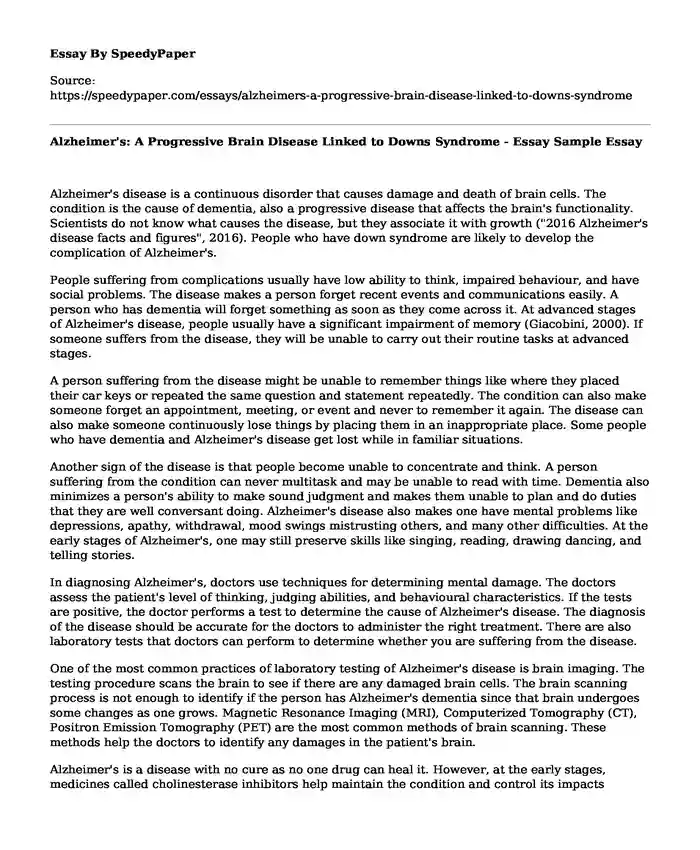
| Type of paper: | Essay |
| Categories: | Mental health Mental disorder Disorder |
| Pages: | 3 |
| Wordcount: | 668 words |
Alzheimer's disease is a continuous disorder that causes damage and death of brain cells. The condition is the cause of dementia, also a progressive disease that affects the brain's functionality. Scientists do not know what causes the disease, but they associate it with growth ("2016 Alzheimer's disease facts and figures", 2016). People who have down syndrome are likely to develop the complication of Alzheimer's.
People suffering from complications usually have low ability to think, impaired behaviour, and have social problems. The disease makes a person forget recent events and communications easily. A person who has dementia will forget something as soon as they come across it. At advanced stages of Alzheimer's disease, people usually have a significant impairment of memory (Giacobini, 2000). If someone suffers from the disease, they will be unable to carry out their routine tasks at advanced stages.
A person suffering from the disease might be unable to remember things like where they placed their car keys or repeated the same question and statement repeatedly. The condition can also make someone forget an appointment, meeting, or event and never to remember it again. The disease can also make someone continuously lose things by placing them in an inappropriate place. Some people who have dementia and Alzheimer's disease get lost while in familiar situations.
Another sign of the disease is that people become unable to concentrate and think. A person suffering from the condition can never multitask and may be unable to read with time. Dementia also minimizes a person's ability to make sound judgment and makes them unable to plan and do duties that they are well conversant doing. Alzheimer's disease also makes one have mental problems like depressions, apathy, withdrawal, mood swings mistrusting others, and many other difficulties. At the early stages of Alzheimer's, one may still preserve skills like singing, reading, drawing dancing, and telling stories.
In diagnosing Alzheimer's, doctors use techniques for determining mental damage. The doctors assess the patient's level of thinking, judging abilities, and behavioural characteristics. If the tests are positive, the doctor performs a test to determine the cause of Alzheimer's disease. The diagnosis of the disease should be accurate for the doctors to administer the right treatment. There are also laboratory tests that doctors can perform to determine whether you are suffering from the disease.
One of the most common practices of laboratory testing of Alzheimer's disease is brain imaging. The testing procedure scans the brain to see if there are any damaged brain cells. The brain scanning process is not enough to identify if the person has Alzheimer's dementia since that brain undergoes some changes as one grows. Magnetic Resonance Imaging (MRI), Computerized Tomography (CT), Positron Emission Tomography (PET) are the most common methods of brain scanning. These methods help the doctors to identify any damages in the patient's brain.
Alzheimer's is a disease with no cure as no one drug can heal it. However, at the early stages, medicines called cholinesterase inhibitors help maintain the condition and control its impacts (Giacobini, 2000). Scientists have no explanation of how the drugs work but argue that the drugs prevent the breakdown of acetylcholine, a chemical found in the brain that aids in memory. However, the drugs lose their effect with time, and the person regains their inability to remember.
Nursing attention that Alzheimer's disease patients require includes ensuring that the person baths daily, maintain oral health, practices body enhancement, and does regular exercises. People with Alzheimer's disease should not get complicated requests and instructions. We should, therefore, give the patients of dementia and Alzheimer's simple tasks that require little mental input. The people should also help the patients to remain calm and support them when in need.
References
2016 Alzheimer's disease facts and figures. (2016), 12(4), 459-509. https://doi.org/10.1016/j.jalz.2016.03.001
Giacobini, E. (2000). Cholinesterase Inhibitor Therapy Stabilizes Symptoms of Alzheimer Disease. Alzheimer Disease And Associated Disorders, 14(Supplement), S3-S10. https://doi.org/10.1097/00002093-200000001-00002
Cummings, J. (2004). Long-Term Treatment for Patients with Alzheimer Disease. Alzheimer Disease & Associated Disorders, 18, S1. https://doi.org/10.1097/01.wad.0000127491.57408.4c
Cite this page
Alzheimer's: A Progressive Brain Disease Linked to Downs Syndrome - Essay Sample. (2023, Oct 27). Retrieved from https://speedypaper.net/essays/alzheimers-a-progressive-brain-disease-linked-to-downs-syndrome
Request Removal
If you are the original author of this essay and no longer wish to have it published on the SpeedyPaper website, please click below to request its removal:
- Essay Example on Proteins and Bovine Spongiform Encephalopathy
- Essay Example on the Effects of GMO Food on Human Health
- Essay Sample on the Article Reviewed
- Paper Example: Roseola Infantum
- Free Essay: Legal and Ethical Issues in Mental Health Nursing
- Health Professionals in Nadir Public Health Organization - Free Essay
- Navigating Change: Restaurant Brand International's Response to the COVID-19 Pandemic Challenges
Popular categories




